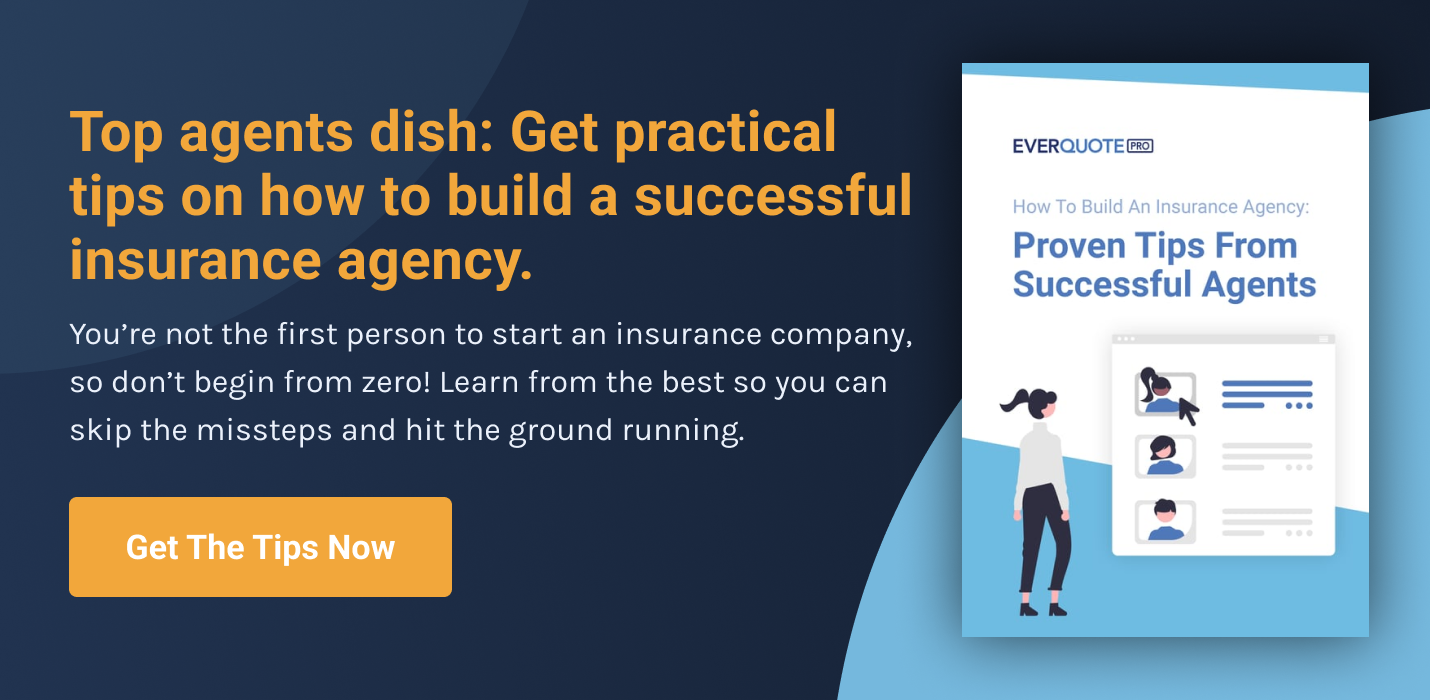- Home»
- EverQuote Pro Blog»
- Insurance Agency Automation: Top 8 Best Practices
Insurance Agency Automation: Top 8 Best Practices

Do you hear the words insurance agency automation and imagine robots taking over your business? Think again. When applied to insurance, automation can reduce human error, increase the quality and quantity of leads, and boost your bottom line.
8 Insurance Agency Automation Tips
“In any agency, speed to contact is the key factor for raising contact and conversion rates,” explains Brett Schickler, Director of Sales at Ricochet360. “If someone goes online and fills out a request, when did they want to be contacted? As quickly as possible.” Insurance automation can help agencies respond to potential prospects faster, producing a more efficient contact and close process.
Here are seven insurance agency automation ideas you can start implementing now:
1. Automate your lead workflow.
“When you’re vying for business, there is potential that someone else is also reaching out to that customer,” says Schickler. “So the first one to the punch is usually going to win that business.” Therefore, it’s essential to get leads into the workflow, prioritize them, and send them to the first available team members right away. Insurance sales automation platforms can expedite this effort.
2. Automate all messaging channels in your follow-up process.
Every agent has a channel they feel most comfortable using, whether it’s phone, email, or text (where allowed). Using multiple channels helps you understand which are most comfortable for consumers.
Most agents don’t want to take the time to set up these multiple channels—after all, it is time consuming to get everything started. However this is an area where spending time on the front end can really pay off, because once you’ve set everything up once, you don’t have to do it again. The best part? Most (if not all) of these channels can be automated. For example, you’re probably already calling in a specific cadence (and if not, check out these best practices).
Automating email responses is probably the easiest place to start—you can “set it and forget it,” knowing every single person on your list will get clear, consistent emails at the right time. Text messaging can be a little more difficult, because specific carriers and states have different rules for using text messages. However, if you can use text messaging and automation, you should.
One-off, ad hoc emails can confuse prospects, annoy customers, and dilute your brand messaging.
We’ve got a better way: Download 7 Insurance Email Templates You Can Start Using Today
3. Create a repeatable contact process.
After establishing a way to add leads to a queue quickly, you need a repeatable contact process. “The average salesperson calls a lead 1.5 times before considering it an old lead and stopping contact. But the average prospect needs six to seven touches before they make contact,” Schickler explains. Set a cadence for your team members so leads are called as soon as possible, and build future automatic follow-ups into the workflow.
4. Call new leads early and often.
After you quote, you need the same salesperson to follow up consistently until you get a firm yes or even a no. With insurance agency automation, you can predetermine your team’s future call, email, and social media content and cadence. “One click may set up 18 phone calls into the future over the next 30 days, maybe two auto texts, and eight emails, all sent at different, preset times,” Schickler says. “You don’t have to have a salesperson remember to sign in on day 30 to send that follow-up text message or email.” This type of agency automation “gives us more opportunity to prospect. The more opportunity for quality conversations a salesperson can have, the more opportunities they have to quote and sell business.”
5. Metrics matter.
Top performers all have consistent metrics. According to Schickler, there’s a direct relationship between how many calls producers make in a day, how long they talk to leads, and their overall productivity. “All top performers hit a minimum of three hours’ talk time per day, and a minimum of 150 calls with high-quality leads per day,” he says. To reach that goal, consider breaking up the workday so that producers strive for one hour of quality calls for every two hours of work. “By the end of day, everyone will hit four hours.” Platforms with preset autodialing can help teams meet their call goals.
6. Set attainable KPIs.
Key performance indicators (KPIs) clarify the goals your agency is working toward. Schickler suggests reverse-engineering the practices of your top performers to understand what is possible. You should be tracking these 10 core KPIs:
Core KPIs To Watch
1. Monthly Bind Rate. This one almost goes without saying, but looking at the bind rate (the percentage of quotes given to leads that are converting into bound policies) is an absolute must. This can further be broken down to see each producer’s individual bind rate per month.
2. Quote Rate (Daily, Weekly and Monthly). Out of the total number of leads you’ve contacted, quote rate tells you how many you have been able to quote. Again, this should be broken down by producer (and even marketing/lead source) to assess individual performance.
3. Contact Rate. Of the total number of leads you've reached out to, this tells how many you’ve made contact with. As with quote rate, break this down by producer.
4. Cost Per Bind (cost per acquisition). This is another incredibly important KPI that is often overlooked. Cost per bind tells you how much it costs your agency to bind a policy or acquire a customer per month. Aside from your overall cost-per-bind, you’ll want to also break it down by marketing/lead source.
5. Cost Per Quote. Cost per quote is another crucial KPI that is often ignored by agents—it monitors how much it costs you to put your quote in front of a consumer. If you are seeing a low cost per quote but a high cost per bind, it lets you know something is causing prospects to drop off after they receive a quote (but before they bind). Looking at this on a monthly basis is most important, but it can also be broken down weekly or even daily.
6. Cost Per Premium by Lead Source. This KPI is crucial to connecting marketing sources with acquisition cost. It breaks down the monthly cost to drive in $X in premium, broken down by the lead sources you were buying from.
7. Cost Per Bind by Lead Vertical. This KPI shows how much it costs your agency to bind an auto policy versus a home policy. You’ll learn which verticals (auto, home, life) your team sells best. It should be tracked on a monthly basis, although it can also be useful to track weekly.
8. Cost Per Item by Lead Vertical. Similar to the previous KPI, this helps you understand which vertical (auto, home, life) allows the most items to be written. It should be tracked on a monthly basis.
9. Cost Per Bind by Producer. This tracks each producer’s individual bind rate and how much it costs to bind a new policy (by producer). This should be tracked monthly, but can also be useful to track weekly.
10. Producers Talk Time and Dials. These are crucial for understanding your producers’ activity levels, and how well they are doing with prospecting. A producer with low talk time and dials (compared to other producers) should be a red flag.
Tracking and reviewing your KPIs shows what’s going well and what’s not. For example, if you’re getting a high open rate at X time, you can simply shift your strategy to send emails at that time vs. having to reinvent the wheel.
Most established agencies have a reporting system, like their carrier’s portal or CRM, to help them track KPIs. However, even smaller agencies that don’t have access to more sophisticated tools can (and should!) be tracking a whole set of KPIs we’ve listed here.
7. Welcome referrals.
Incentivize providers to network with local car dealers, loan originators, realtors, and others who work with the type of customers who need your products. “Any platform you choose should have a strong referral component,” advises Schickler. Some platforms allow referral partners to automatically send leads directly to your workflow, which means leads are contacted right away. “Your leads will be very impressed with the level of service,” says Schickler. (Read about the EverQuote insurance referral program here.)
8. Tracking and Reporting.
No matter how hard people try, when they manually track conversion rates at the end of each day, they can overlook details. Forget the spreadsheet. “You need something to give visibility to acquisition costs and application costs,” Schickler says. “These insights help dial in marketing strategy and maximize your investment.” Look for a tool that helps automate data collection, and thereby your sales strategy.
Success in insurance sales comes from calling good leads as quickly as possible. Using a combination of high-quality leads from EverQuote and these insurance agency automation ideas, you can build a reliable revenue stream with a minimum of effort.
Unlock predictable growth with EverQuote.
Our representatives are standing by to help you succeed.
Call 844-707-8800
Weekdays, 9AM-5PM (ET)
Call 844-707-8800
Weekdays, 9AM-5PM (ET)
Accelerate your growth.
Complete the form below or just call 844-707-8800 to learn how we can help you achieve your goals.
By clicking "Get Started", I consent by electronic signature to being contacted by EverQuote, including by automatic telephone dialing and/or an artificial or prerecorded voice (including SMS and MMS - charges may apply), regarding EverQuote for Agents, even if my phone number is listed on a Do Not Call Registry. I also understand that my agreement to be contacted is not a condition of purchasing any goods or services, and that I may call (844) 707-8800 to speak with someone about EverQuote for Agents.
By clicking "Get Started", I affirm that I have read and agree to this website’s Privacy Policy and Terms of Use, including the arbitration provision and the E-SIGN Consent.
* Mandatory fields
 Product Overview
Product Overview Blog
Blog FAQs
FAQs Webinars
Webinars eBooks & Resources
eBooks & Resources